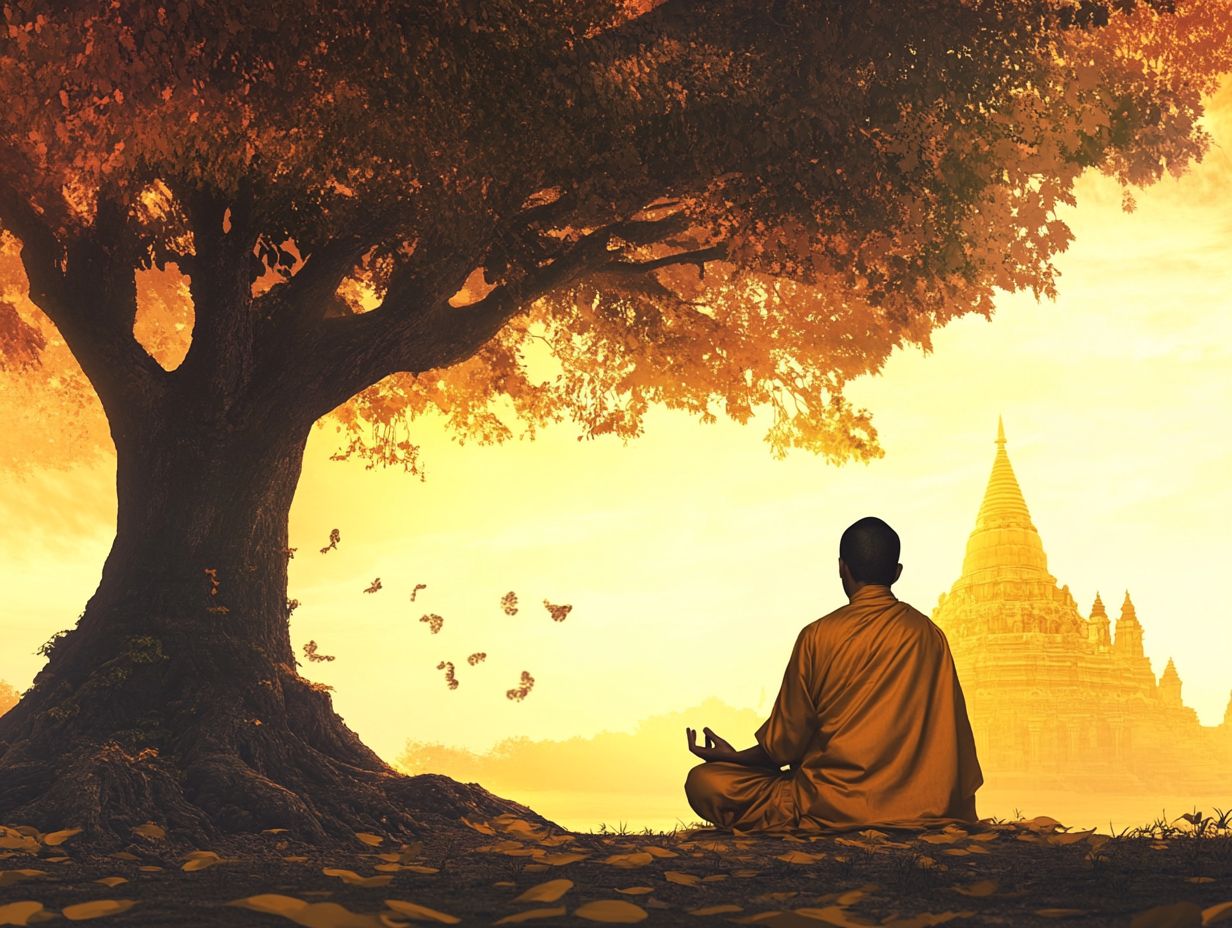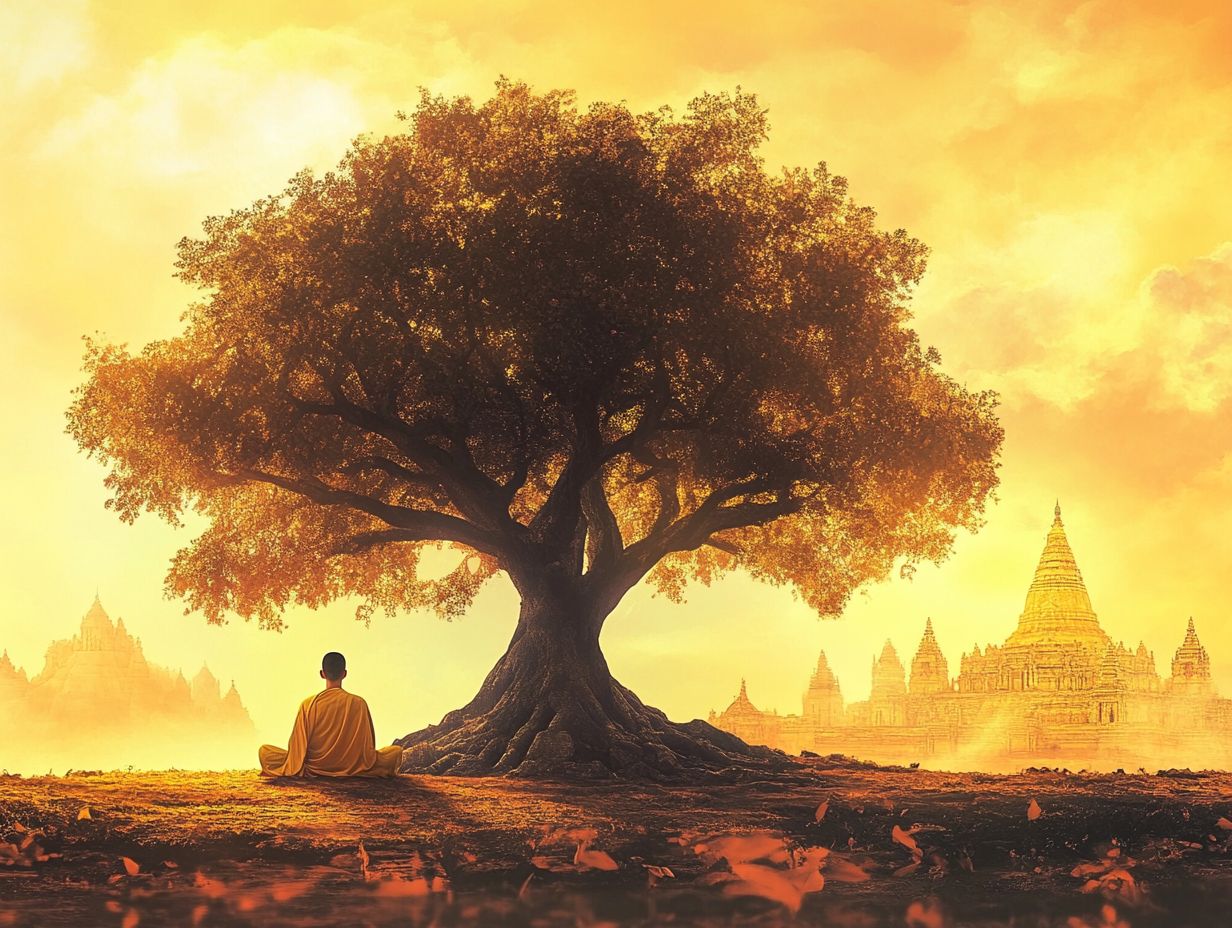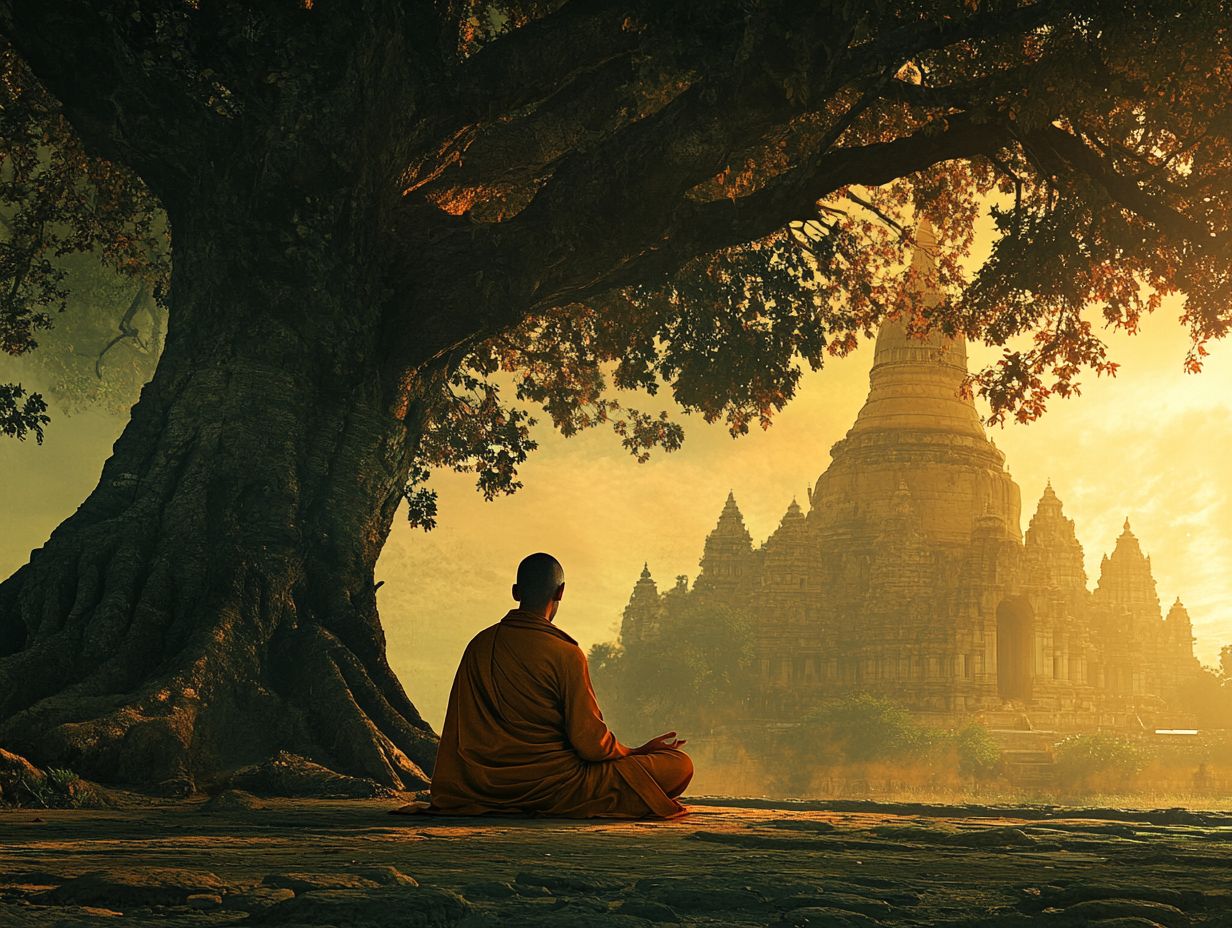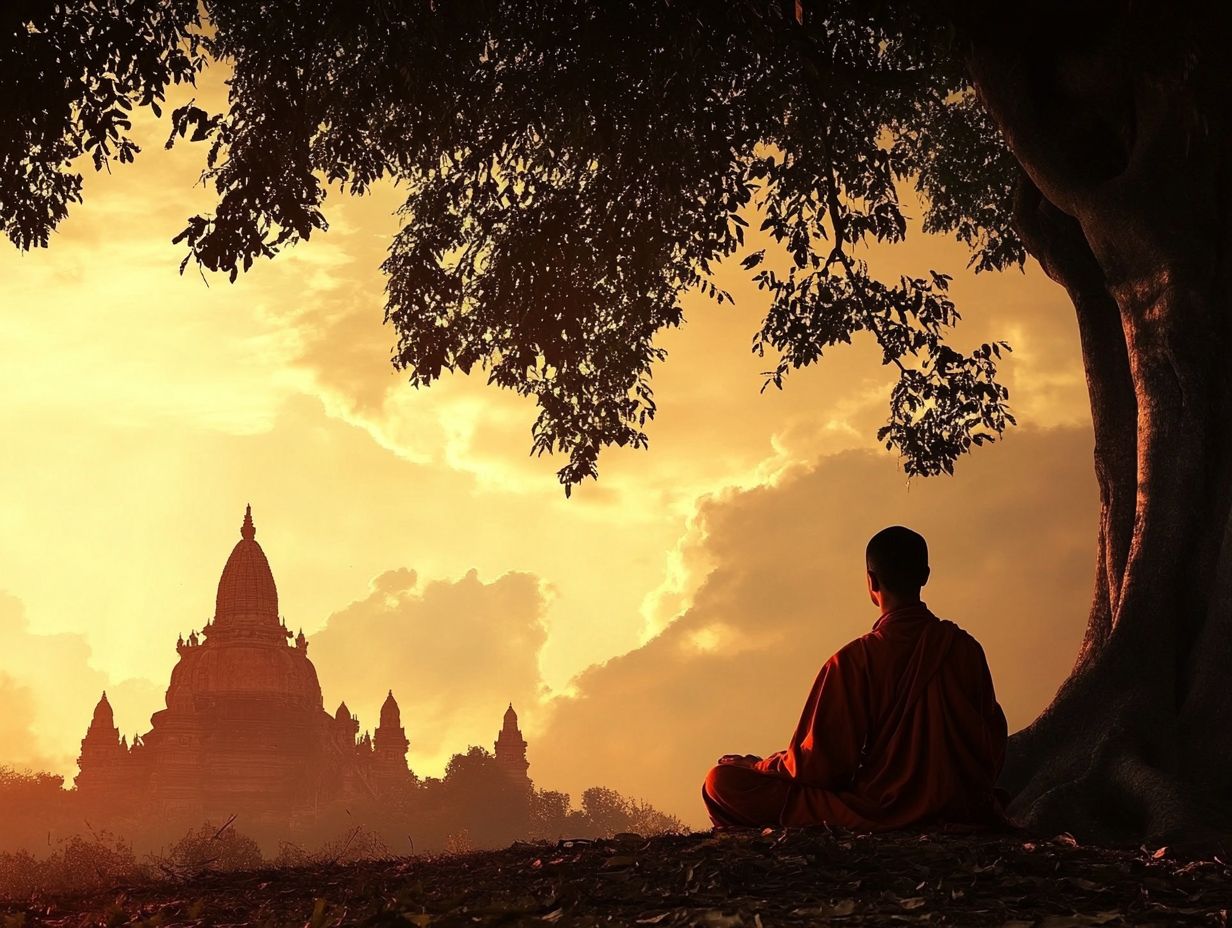Why Does Buddhism Reject the Priests of Hinduism?
In the exploration of the spiritual landscapes of Hinduism and Buddhism, one encounters a captivating interplay between these two traditions, particularly in the roles of priests, monks, and their teachings of religious reform and transcendence.
This article delves into the significance of Hindu priests, examining their selection processes and responsibilities, while juxtaposing these roles against Buddhist practices that distinctly eschew the priestly hierarchy found in Hinduism, emphasizing asceticism and non-violence.
As the reader navigates through the core beliefs, rituals, and practices of both religions, they will uncover the unique paths each tradition takes in worship, community life, and the pursuit of enlightenment.
This discourse invites an understanding of the nuanced relationships and philosophical differences that define these ancient faiths, exploring their moral teachings and spiritual path.
What is the Role of Priests in Hinduism?

In Hinduism, priests play a vital role as spiritual leaders and custodians of religious practices, intricately linked to the caste system and the rituals that form the foundation of this ancient belief system, including samsara and the pursuit of Dharma.
Typically belonging to the Brahmin caste, these priests are tasked with performing sacred rites, interpreting scriptures, and preserving the continuity of cultural traditions through their profound knowledge of religious texts such as the Vedas, Upanishads, and other significant Hindu scriptures.
Their responsibilities transcend the mere execution of ceremonies; they serve as a conduit between the divine and the lay community, providing guidance and facilitating worship both in temples and within the sanctity of homes, reinforcing the moral values and ethical conduct prescribed by Hindu philosophy.
How are Priests Chosen in Hinduism?
In Hinduism, the selection of priests is profoundly influenced by the caste system, which traditionally assigns individuals from the Brahmin caste to fulfill these vital spiritual roles. This historical context is intricately woven into thousands of years of social hierarchy, where lineage often determines not just one’s occupation but also their perceived spiritual authority and legitimacy within the community.
The implications of this caste distinction reach far beyond the mere selection of priests; they shape the expectations placed upon spiritual leaders to uphold religious traditions and perform rituals that resonate deeply with their followers. As a result, community practices and worship rituals are frequently rooted in this hierarchical framework, reinforcing the notion that spiritual legitimacy is fundamentally tied to one’s caste.
This reliance on caste creates layers of complexity, as both spiritual and communal expectations require that these rituals be conducted by those deemed ‘qualified‘ due to their birthright. Such dynamics significantly affect the very fabric of faith practices within Hindu communities, intertwining spiritual authority with social structure in a manner that is both profound and pervasive.
What are the Duties of Hindu Priests?
The responsibilities of Hindu priests span a remarkable array of duties, encompassing everything from conducting rituals and ceremonies to imparting wisdom through sacred scriptures and guiding the community in spiritual practices.
These esteemed individuals act as guardians of tradition, ensuring that significant rites such as weddings, naming ceremonies, and last rites are performed with the highest level of respect and strict adherence to religious protocols. They are not merely facilitators of prayers and offerings; they also play an essential role in educating devotees about the profound meanings intertwined with these rituals, thereby nurturing a deeper understanding of their faith and moral philosophy.
By actively engaging with the community, they cultivate a sense of belonging and continuity among practitioners, ultimately strengthening interpersonal relationships and support networks. Their influence extends well beyond the confines of the temple, as they frequently offer counsel and guidance, helping withdividuals in navigating life’s complexities while upholding moral and ethical values deeply rooted in Hindu philosophy.
Why Does Buddhism Reject the Priests of Hinduism?
Buddhism emerged as a distinct path, consciously rejecting the priestly authority of Hinduism, which it perceived as excessively ritualistic and entangled in the caste system that impeded spiritual growth and enlightenment. This rejection emphasized the need for personal spiritual autonomy and critical inquiry into one’s beliefs.
Founded by Siddhartha Gautama, Buddhism seeks to liberate individuals from suffering through direct experience and meditation, placing a strong emphasis on personal spiritual journeys and cognitive liberation rather than reliance on priestly intermediaries.
This rejection is fundamentally anchored in the belief that genuine understanding of dharma and karma must arise from individual practice, meditation, and the relentless pursuit of enlightenment, rather than dependence on religious authorities or external rituals.
What are the Core Beliefs of Buddhism?

The core beliefs of Buddhism revolve around the concepts of karma, dharma, and the quest for enlightenment and nirvana, creating a distinctive philosophical framework that prioritizes non-attachment and the alleviation of suffering.
At the essence of this spiritual journey are the Four Noble Truths, which illuminate the nature of suffering, its origins, the potential for its cessation, and the path leading to liberation. This is where the Eightfold Path becomes significant, offering practitioners a comprehensive guide through ethical teachings, meditation techniques, and mental discipline essential for achieving a harmonious existence.
In contrast to many ideals presented in Hinduism, which often emphasize a multitude of deities and diverse routes to the divine, Buddhism advocates for a more introspective approach. It encourages individuals to assume personal responsibility for their spiritual growth. Such teachings not only underscore the interconnectedness of all beings but also furnish a pragmatic roadmap toward inner peace and harmony.
How do Buddhist Views on Priests Differ from Hinduism?
Buddhist perspectives on priests present a striking contrast to those found in Hinduism, where priests are regarded as essential religious figures. In Hinduism, the priest acts as a vital intermediary between devotees and the divine, undertaking elaborate rituals and providing theological guidance. This reliance on priestly authority reflects a structured approach to spirituality, deeply embedded in rituals, traditions, and social structures.
In contrast, Buddhism encourages its practitioners to pursue enlightenment through personal insight and meditation. It promotes a path that values self-awareness and spiritual autonomy over ritualistic dependence. This distinction underscores a fundamental divergence between the two traditions; Buddhism advocates for a more secular and introspective journey toward spiritual growth, enabling individuals to cultivate their understanding of suffering and liberation independently of priests or elaborate ceremonies.
What are the Differences Between Buddhist and Hindu Practices?
Buddhist and Hindu practices reveal notable distinctions, encompassing the rituals undertaken and the conceptual frameworks that inform their spiritual pursuits. Each tradition reflects its unique belief system and offers a distinct pathway to enlightenment, highlighting the rich diversity of thought and practice within these ancient philosophies, including the concepts of samsara and the pursuit of ethical conduct.
How do Buddhists Worship and Practice?
Buddhists immerse themselves in worship and practice through a harmonious blend of meditation, rituals, and community gatherings, all centered on mindfulness and the teachings of Siddhartha Gautama. These practices transcend the realm of routine; they serve as profound pathways for cultivating enlightenment and compassion in daily life, reinforcing the principles of non-theism and existential inquiry.
Meditation stands out as a cornerstone of Buddhist worship, enabling practitioners to deepen their self-awareness and forge a connection with their innermost thoughts and feelings. Furthermore, community engagement through shared rituals nurtures a sense of belonging and collective support, highlighting the interconnected nature of existence as emphasized in Buddhist philosophy.
This elegant fusion of individual and communal experiences enriches one’s spiritual journey, reinforcing the ideals of loving-kindness and compassion that are essential to the Buddhist path.
What are the Main Practices of Hinduism?

Hinduism weaves a rich tapestry of practices, encompassing rituals, festivals, and daily worship of deities, each integral to its spiritual essence. These practices illuminate the profound connection individuals share with the divine, showcasing a diverse array of customs that vary significantly across different regions and communities, reinforcing faith and religious tolerance.
Rituals such as pujas (worship ceremonies), homas (fire offerings), and samskaras (life-cycle rites) play vital roles in the lives of devotees, offering them opportunities for personal expressions of devotion while remaining anchored in traditional beliefs. The presence of priests is essential, as they guide participants through these sacred ceremonies, ensuring that rituals are conducted with the utmost reverence and adherence to established techniques, reflecting the symbolism and significance of each act.
Festivals like Diwali and Holi serve not only to celebrate mythological narratives but also to foster a sense of unity among individuals. These occasions blend personal spirituality with communal harmony, illustrating the vibrant diversity that characterizes Hindu culture, reinforcing the importance of community engagement and ethical implications.
What is the Role of Monks in Buddhism?
In Buddhism, monks occupy a vital position within the community, epitomizing the principles of monasticism. They serve as paragons of spiritual growth and discipline, exemplified by their commitment to rigorous meditation practices.
How are Monks Chosen in Buddhism?
The selection of monks in Buddhism is often grounded in individual aspiration and commitment to monastic life, as prospective monks embark on a rigorous training and initiation process. This journey not only reflects their personal dedication to spiritual enlightenment but also underscores the vital role of the community in assessing their readiness.
Within the diverse traditions of Buddhism, candidates are evaluated based on their adherence to fundamental monastic values such as humility, compassion, and discipline. The process frequently includes mentorship from established monks who guide these individuals through a series of tests and teachings, cultivating a sense of communal support that reinforces the significance of spiritual leadership.
Ultimately, the selection of monks emerges as a collaborative endeavor, highlighting the intricate interplay between personal commitment and collective responsibility within the monastic community.
What are the Duties of Buddhist Monks?
Buddhist monks engage in a diverse range of responsibilities, encompassing meditation, teaching the dharma, and serving their communities, all of which are essential to their spiritual journey and personal growth.
These duties not only facilitate their own path toward enlightenment but also illuminate the way for the lay community. Through consistent meditation practices, they nurture mindfulness and inner peace, truly embodying the core tenets of Buddhist philosophy.
As educators, monks impart profound insights and teachings, guiding individuals through the intricacies of life with compassion and wisdom. Their dedication to community service stems from a deep awareness of interconnectedness, as they actively participate in initiatives that foster social welfare, environmental stewardship, and charitable efforts.
This comprehensive approach not only fortifies the essence of Buddhist teachings but also serves as an inspiration for others to incorporate similar practices into their own lives.
Frequently Asked Questions

Why does Buddhism reject the priests of Hinduism?
Buddhism does not have a hierarchical priesthood like Hinduism. It emphasizes the individual’s own spiritual journey and rejects the idea of a mediator between humans and the divine.
What are the key differences between the priests of Hinduism and Buddhism?
Hindu priests are seen as the intermediary between humans and the gods, while in Buddhism, individuals are responsible for their own spiritual progress and do not need a priest to attain enlightenment.
Do Buddhists believe in the concept of a divine priesthood?
No, Buddhism does not believe in the concept of a divine priesthood. It emphasizes the teachings of the Buddha and the individual’s own spiritual journey, rather than relying on a priesthood for guidance.
How does the rejection of priests in Buddhism align with its teachings?
Buddhism teaches self-reliance and the idea of non-attachment, which goes against the idea of relying on a priest for spiritual guidance. Rejecting priests allows individuals to take control of their own spiritual progress.
Does this mean that Buddhism rejects all forms of religious authority?
No, Buddhism still recognizes the importance of spiritual teachers and mentors. However, the role of a teacher in Buddhism is to guide individuals on their own journey towards enlightenment, rather than acting as a mediator between them and the divine.
Is there any animosity between Buddhism and Hinduism due to the rejection of priests?
No, both religions have coexisted peacefully for centuries and share many similarities. While there may be differences in certain beliefs and practices, there is no animosity between the two religions.
